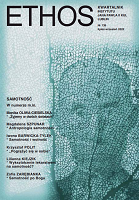OJCZYZNA – OKRUTNA MATKA „AVE PATRIA, MORITURI TE SALUTANT...” WŁADYSŁAWA S. REYMONTA
THE MOTHERLAND—A CRUEL MOTHER: “AVE PATRIA, MORITURI TE SALUTANT...” BY WŁADYSŁAW S. REYMONT
Author(s): Aleksandra LISZKASubject(s): Polish Literature, Social Theory, Sociology of Culture, Theory of Literature, Sociology of Literature
Published by: Katolicki Uniwersytet Lubelski Jana Pawła II - Instytut Jana Pawła II, Wydział Filozofii
Keywords: sacrifice; war; Great Mother; motherland; loneliness; Ave Patria; Władysław S. Reymont;
Summary/Abstract: The paper offers an interpretation of Władysław S. Reymont’s “Ave Patria, morituri te salutant...” with a view to the ways in which the short story manifests the workings of The Great Feminine Archetype, as scrutinized by Erich Neumann. The work in question describes the attack of Japanese blockships at Port Arthur during the Russo-Japanese War of 1904–1905, highlighting the relationship between human beings and their motherland the text embraces. Like the archetypical Great Mother, the motherland manifests a duality: it can show the face either of a good mother or of a cruel one, which is demonstrated in her attitude to the commanders and the soldiers, respectively. However, the story depicts neither an actual armed confl ict nor an actual enemy, the attack at Port Arthur suggesting an unreasonable sacrifi ce on the part of the soldiers instead. Thus the plot inspires refl ection—suggested already by the short story’s title—on war as a form of playground for both the commanders and the motherland, where the lives of the soldiers, conceived of as human mass, are at stake. The paper also provides a detailed analysis of the contrasting portrayals of the soldiers and the commanders in the text which can be seen on the audial and visual levels (silence as opposed to speech; unifi cation as opposed to individuation). The contrast in question also comes to light in an analysis of the difference between the two groups in their offering of life which, in the case of the commanders, results in a deifi cation, and, in the case of the soldiers, is tantamount to oblivion and loneliness in death. Thus the paper addresses also Reymont’s concepts of the motherland and of the soldiers’ lot in life.
Journal: Ethos. Kwartalnik Instytutu Jana Pawła II KUL
- Issue Year: 35/2022
- Issue No: 3
- Page Range: 265-284
- Page Count: 20
- Language: Polish
- Content File-PDF

